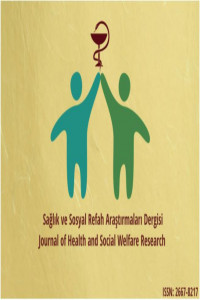Banka personelinin COVID-19 korkusunun incelenmesi
Koronavirüs, Covid-19, Pandemi, Banka peroneli, COVID-19 korkusu
Coronavirus, COVID-19, Bank Staff, Fear of COVID-19, Pandemic,
___
- Ahorsu, D., Lin, C., Lmani, V., Saffari, M., Griffiths, M., & Pakpour, A. (2020, March 27). The Fear of COVID-19 Scale: Development. International Journal of Mental Health and Addiction.
- Arslan, D. A. (2006). Medyanın birey, toplum ve kültür üzerine etkileri. Uluslararası İnsan Bilimleri Dergisi.
- Aydın, A. F. (2020). Post-Truth dönemde sosyal medyada dezenformasyon covid- 19 (Yeni koronavirüs) pandemi süreci. (12). Asya Studies Academic Social Studies/Akademik Sosyal Araştırmalar Dergisi.
- Baldwin, R., & Mauro, B. (2020, March 6). Economics in the time of COVID-19: A new a book.
- Brooks, S., Webster, R., Smith, L., Woodland, L., Wessely, S., Greenberg, N., & Rubin, G. (2020, March). The psychological impact of quarantine and how to reduce it: rapid review of the evidence. 395(102207), 912-920. The Lancet Psychiatry.
- Crosby, A. (2003). America's forgotten pandemic; The İnfluenza of 1918 (2nd ed). (C. U. Press, Dü.) Cambridge.
- Çınar, F., Çapar, H. ve Ekinci, G. (2021). Effect of COVID-19 anxiety on perceived risks and avoidance behaviors. Annals of Clinical and Analytical Medicine. DOI: 10.4328/ACAM.20463.
- Demirbilek, Y., Pehlivantürk, G., Özgüler, Z., & Alp Meşe, E. (2020). COVID-19 outbreak control, example of ministry of health of Turkey. TURKISH JOURNAL OF MEDICAL SCIENCES, 50(SI-1), 489-494.
- Dırvar, F., Uzun Dırvar, S., Köksal, A., Çimen, O., Erbaş, A., Bayhan, İ., & Kaygusuz, M. (2021). Experiences from a non-COVID hub referral orthopedic trauma hospital during the COVID-19 pandemic in Turkey. International Journal Of Research In Orthopaedics, 7(2), 183.
- Duran, M., & Acar, M. (2020). Bir Virüsün Dünyaya Ettikleri: Covid-19 Pandemisinin Makroekonomik. 54-67. International Journal of Social and Economic Sciences.
- Gu, C., Jiang, W., Zhao, T., & Zheng, B. (2020, March 9). Mathematical recommendations to fight against COVID-19.
- Hair, J., Black, C., Babin, B., Anderson , R., & Tatham, R. (2013). Multivariate. Pearson Education Limited. Hobfoll, S., Watson, P., Bell, C., Bryant, R., Brymer, M., Freidman, M., . . . Jong, J. (2008, January). Five Essential Elements of Immediate and Mid–Term Mass Trauma Intervention: Empirical Evidence. 283-315. Psychiatry: Interpersonal and Biological Processes,.
- Huremovic, D. (2019). Psychiatry of Pandemics A Mental Health Response to Infection Outbreak. Springer Nature Switzerland AG .
- Kaya, B. (2020). Pandeminin ruh sağlığına etkileri. 123-124. Klinik Psikiyatri.
- Lai, C. (2020). Asymptomatic carrier state, acute respiratory disease, and pneumonia due to severe acute respiratory syndrome coronavirus 2 (SARS-CoV-2). 53(3), 404-412. Journal of Microbiology, Immunology and Infection.
- Naeem , F., Irfan, M., & Javed, A. (2020, January- March). Coping with COVID-19: urgent need for building resilience through cognitive behaviour therapy. 12(1). Khyber Medical University Journal.
- Reger, M., Ian, H., & Joiner, T. (2020). Suicide Mortality and Coronavirus Disease 2019—A Perfect Storm? Journal of the American Medical Association Psychiatry. doi:JAMA Psychiatry. 2020;77(11):1093-1094. doi:10.1001/jamapsychiatry.2020.1060.
- Torales, J., O'Higgins, M., & Castaldelli-Maia, J. (2020). The outbreak of COVID-19 coronavirus and its impact on global mental health. Int J Social Psychiatry.
- WHO. (2020, 03 31). Rolling updates on coronavirus disease (COVID-19). URL. World Health Organization. (2010b). What is a pandemic? https://www.who.int/emergencies/diseases/novel-coronavirus-2019/events-as-they-happen, http://www.who.int/csr/disease/swineflu/frequently_asked_questions/pandemic/en/, accessed April 14, 2021.
- Yayın Aralığı: Yılda 2 Sayı
- Başlangıç: 2018
- Yayıncı: Haşim ÇAPAR
Sağlık Yönetimi Öğrencilerinin Uzaktan Eğitim İle İlgili Algıları
Şeyma Nur GÜL, Sıla Zeynep KUBİLAY, Ali ARSLANOGLU
COVID-19 Salgını Sürecinde Öz-Değerlendirme ve Serbest Zaman Algısı İlişkisi
Sağlık Kurumlarında Farklılık Yönetimi
Meslek Yüksekokulu Öğrencilerinin Başarı Yönelimlerinin İyi Oluş Modeli (PERMA) İle İlişkisi
İsmail BİÇER, Doğancan ÇAVMAK, Duygu DENİZ, Mustafa ÖZAL
Banka personelinin COVID-19 korkusunun incelenmesi
Bir Güven Araştırması: “Hayat Eve Sığar” Uygulaması
Hasan Giray ANKARA, Büşra TEKİN
Schumpeter'in Kapitalizm, Kalkınma, Girişimci ve Kredi Perspektifinde İnovasyona Bakışı
Sağlık Politikası Analizi: Göçmen Sağlığı Kapsamında Suriyeli Sığınmacılar
Fatma KANTAS YİLMAZ, Seçil ERGÜL
Betül AKALIN, Fuat YALMAN, Kursad BAYDİLİ, Ayşenur MODANLIOĞLU, Tekin SANCAR
